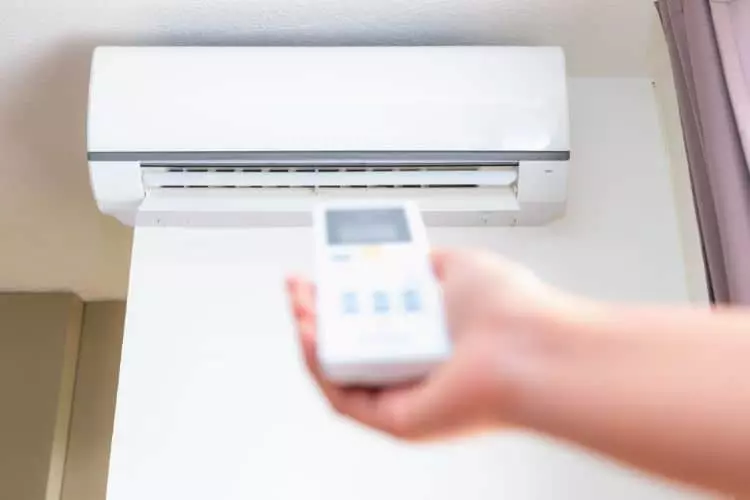Are you tired of dealing with the limitations of traditional AC options? Do you want a flexible and efficient solution to cool and heat your home? Look no further! Mini Split systems are here to revolutionize your HVAC experience.
What are Mini-Split Systems?
Mini-Split systems, also known as ductless air conditioning systems, have become increasingly popular in recent years. Unlike traditional AC units, mini-splits do not rely on ductwork to circulate air. They consist of an indoor air-handling unit and an outdoor condenser, connected by small refrigerant lines.
 Components of a Mini-Split conditioner
Components of a Mini-Split conditioner
Advantages of Mini-Split Systems
Mini-Split systems offer numerous benefits compared to traditional HVAC units:
Energy Efficiency
Ductless systems eliminate energy loss through ductwork, making them more efficient. According to the United States Department of Energy, ducted systems can lose up to 30% of energy due to air leakage. Mini-splits, on the other hand, use several speed compressors and advanced technology to optimize energy usage.
Flexible Installation
Mini-splits are versatile and easy to install. They can be mounted on walls, ceilings, or even stand on the floor. Installation is quick, and in most cases, you won't need to rebuild walls or repair plasterwork.
Improved Air Quality
With mini-splits, you no longer have to worry about dirty ducts spreading allergens and particles into your home. These systems come with filtration cartridges that effectively remove airborne particles, ensuring cleaner and healthier air.
Customized Climate Control
Mini-split systems allow for independent temperature control in different rooms or zones. This feature is beneficial for households with varying temperature preferences or those with specific heating and cooling needs.
Cost Savings
Mini-splits save you money in the long run. They use less power compared to ducted systems, resulting in lower energy bills. Additionally, their compact design minimizes heat loss and ensures more efficient air distribution.
 Mini-Split systems
Mini-Split systems
Single-Zone vs Multi-Zone Systems
Mini-Split systems are available in two types: single-zone and multi-zone.
Single-Zone Systems
A single-zone mini-split consists of one condenser and one air handler. It is suitable for cooling or heating individual rooms. The benefits of single-zone systems include lower carbon footprint, reduced energy bills, and easier installation compared to multi-zone systems.
Multi-Zone Systems
Multi-zone mini-splits are designed to heat and cool multiple areas or rooms. They have one outdoor unit connected to two or more indoor units. Multi-zone systems offer complete control over the temperature of the entire home or business, and they enhance the exterior appearance by requiring fewer outdoor units.
Mini-Split Systems vs Central Air
While central air conditioning systems have been the conventional choice for many years, mini-split systems offer several advantages:
Energy Efficiency
Central AC units often experience energy loss due to ducting, resulting in higher energy costs. Mini-splits, without the need for ducts, eliminate this energy loss and provide more efficient cooling and heating.
Installation and Maintenance
Ductless mini-splits are easier to install compared to central air systems. They require minimal construction work and can be up and running in a shorter amount of time. Additionally, mini-splits have fewer components, making maintenance simpler.
Zoning and Flexibility
Central AC systems cool or heat the entire home, even unused areas. Mini-splits allow for independent temperature control in different zones, ensuring personalized comfort and energy savings.
Improved Aesthetics
Mini-splits have a sleek and compact design that blends seamlessly with your home decor. Unlike central systems, they do not require visible ductwork and bulky outdoor compressors. This enhances the overall appearance of your home.
Are Mini-Split Systems Right for You?
Considering the numerous advantages mini-split systems offer, they are ideal for various situations:
- Allergy sufferers: Mini-splits with built-in filtration cartridges help improve indoor air quality by removing allergens and particles.
- Homes without ductwork: If your home lacks existing ductwork, mini-splits provide an excellent cooling and heating solution without the need for extensive installations.
- New additions or renovations: Mini-split systems are perfect for new rooms or areas that require additional cooling or heating, such as garages, basements, or game rooms.
- Downsizing or limited use areas: With mini-splits, you can control the temperature in specific areas without wasting energy on cooling or heating unused spaces. This is particularly beneficial for downsizing or homes with rooms that are rarely utilized.
- Temperature conflicts and specific needs: If you have family members with different temperature preferences, mini-splits allow for independent temperature control in each room or zone.
How Efficient are Mini-Split Systems?
The efficiency of mini-split systems is measured by the Seasonal Energy Efficiency Ratio (SEER), with higher SEER ratings indicating increased efficiency. In the United States, mini-splits are required to have a minimum SEER rating of 13.0. Energy Efficient Ratio (EER) is another rating to consider, highlighting energy usage per square foot of cooling.
Mini-split systems boast impressive SEER and EER ratings, ensuring efficient temperature regulation and significant energy savings. They can save you up to 30% on your energy bill compared to traditional ducted systems.
Our Top 3 Recommendations
If you're considering investing in a mini-split system, here are our top three recommendations:
-
MRCOOL DIY DIY-12-HP-115B 3rd Generation: With exceptional reliability and efficiency, this model offers a SEER rating of 22 and comes with a seven-year compressor warranty.
-
LG Inverter V LS120HSV5: This unit stands out for its quiet operation and reliability. It has a SEER rating of 22.7 and is perfect for those who prioritize peace and quiet.
-
Cooper & Hunter Single-Zone Ductless Mini-Split AC: Ideal for larger rooms, this model delivers 36,000 BTU per hour and offers a SEER rating of 21.5. It's affordable and comes with a WiFi connection for added convenience.
In Conclusion
Ditch the limitations of traditional AC systems and embrace the efficiency and flexibility of mini-split systems. With their energy efficiency, customizable climate control, and cost savings, mini-splits are the future of home cooling and heating. Choose a reliable brand and enjoy the benefits of cleaner air, quieter operation, and increased comfort in your home.
Continue reading related guides, reviews, and comparisons:
- Best 12,000 BTU Mini Split Systems
- Best 18,000 BTU Mini Split Systems
- Best 24,000 BTU Mini Split Options
- Best 36,000 BTU Mini Split Systems
- Best Lowe’s Mini Split Models
- Best Home Depot Mini Split Models
- Blueridge Mini Split Review
- Best Fujitsu Mini Splits

















